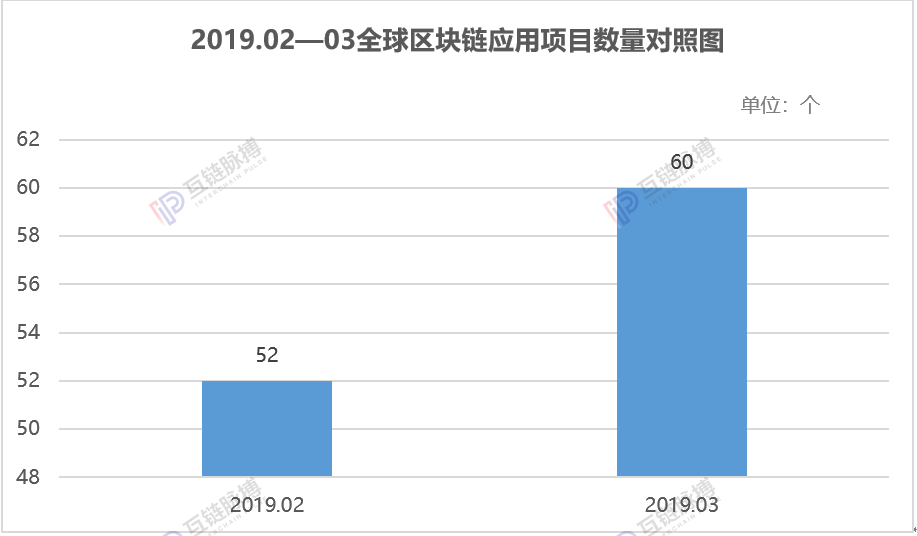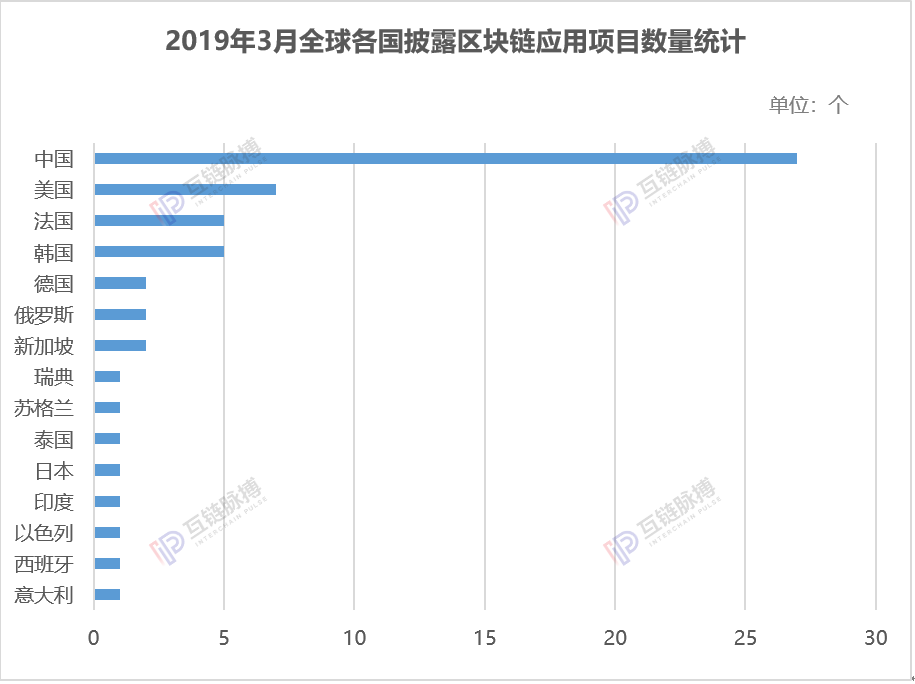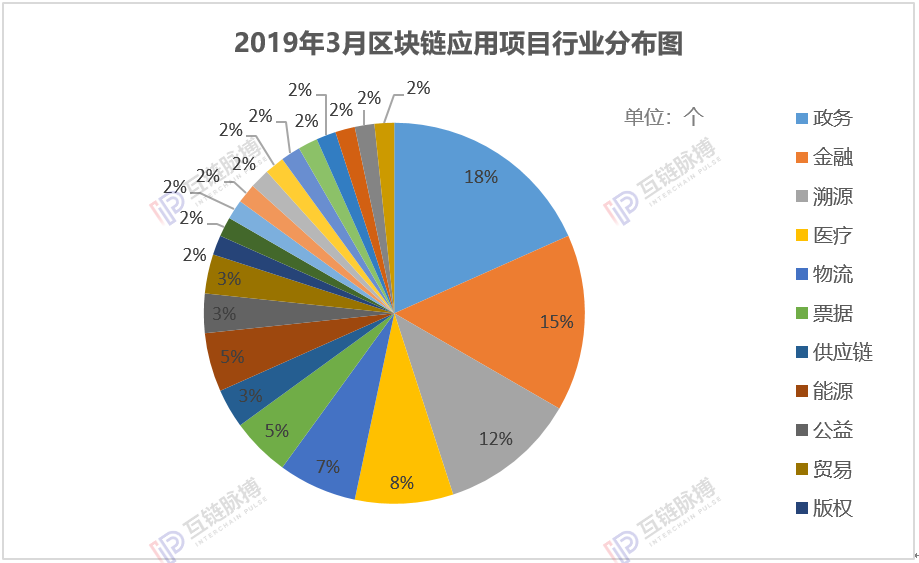March blockchain application monthly report: global blockchain application is accelerating, and the number of China is significantly leading
In March 2019, global blockchain applications began to heat up.
According to the incomplete statistics of the Inter-Chain Pulse Institute, in March 2019, 60 blockchain application projects were disclosed globally, an increase of 15.4% from February.

Among them, the number of domestic blockchain application projects has increased significantly. Of the 60 blockchain applications disclosed in March, there are 27 in China, accounting for 45%. This is followed by the United States, which has seven disclosure applications, followed by South Korea and France, each with five blockchain application disclosure projects.
- The ultimate guide to understanding the differences between PPIO, Filecoin and Storj
- Report: Bitcoin is growing at an incredible rate and can surpass Visa in 10 years
- Ethereum's profits are not enough to ensure its safety

From the perspective of industry distribution, blockchain application projects are still concentrated in the fields of finance, government affairs and traceability, but compared with the past few months, the proportion of projects in the three major sectors is declining. This means that blockchain applications are moving beyond the areas of government, finance and traceability.
According to the statistics of the Mutual Chain Pulse Institute, in March 2019, the blockchain application projects disclosed in the three major areas of government affairs, finance and traceability accounted for 18%, 15% and 12% respectively.
In the field of government affairs, China has promoted the fastest application of blockchain. In addition to blockchain electronic invoices, commercial registration, real estate information registration, and judicial depository evidence collection are becoming hotspots in the government field.
For example, Guangzhou Industrial and Commercial Bureau plans to pilot the “blockchain + commercial service” model in Huangpu District and explore the creation of a shared “registration network”. Chongqing has issued the first electronic business license based on blockchain technology in March, and since then The newly registered business licenses are all added to the government blockchain. The “Real Estate Integration Service Platform” created by Ping An City using blockchain technology has been launched in 28 cities across the country.
In foreign countries, the application of blockchain in the field of government affairs mainly focuses on government election voting. For example, the Russian ruling party, the Russian Party, has applied blockchain technology to electronic voting and counting votes, and Denver, Colorado, also plans to use the blockchain system to store and track votes in the May municipal elections.

In financial projects, blockchain applications are still focused on cross-border business pilots. For example, China's Industrial Bank, Jiangsu Bank, the United States, Western Union and other financial institutions are actively promoting the cross-border business blockchain platform pilot work.
In addition, e-banking acceptance bills, certification mortgages and settlement of repo transactions are becoming new directions for the application of pilot blockchains in financial institutions.
For example, the blockchain electronic billing system developed by the Agricultural Bank of China and the Xiong'an Group has been able to support the group's implementation of the e-banking acceptance billing business in the blockchain fund management platform; Deutsche Bank and Deutsche Börse have successfully used distributed ledgers. The technology enforces a legally binding settlement of repo transactions, while the Spanish stock exchange BME plans to introduce a blockchain system for certification mortgages by the end of the year.
In terms of traceability, food, alcohol and luxury goods are the main application areas.
Especially in the food field, France's Carrefour, China's Shanxi “original vinegar” and American seafood company Bumble Bee Foods have adopted blockchain technology for supply chain tracking and product traceability. The new whisky from the Scottish wine company William Grant & Sons uses blockchain technology to solve the problem of counterfeiting, while LV France is also planning to use blockchain technology to track luxury goods and expand to more than 60 brands.
In addition to the above three areas, the number of blockchain applications in the medical, logistics, supply chain, energy and trade sectors has also increased.
For example, in the medical field, IBM has built blockchain technology platforms in Japan and Israel, respectively, for drug supply, medical data exchange, and counterfeit drugs. In China, Ali Health and Alipay and Wuhan Central Hospital built a "future hospital" based on blockchain and other technologies have also been officially launched.
Overall, government affairs, finance and traceability have opened up a breakthrough for blockchain applications, and as blockchain technology accelerates in industries outside the three major areas, the spring of blockchain applications is accelerating.
This article is [inter-chain pulse] original, the original link: https://www.blockob.com/posts/info/11742 , please indicate the source!
Author: Mutual Research Institute · Liangshan pulse chain Huarong
We will continue to update Blocking; if you have any questions or suggestions, please contact us!
Was this article helpful?
93 out of 132 found this helpful
Related articles
- The blockchain concept stock boom has come again, and many companies are busy clarifying the "hot spot"
- Ethereum co-founder Vitalik Buterin: blockchain technology and cryptocurrency are inseparable
- 3.6 billion dollars! – 2019Q1 Dapp Data Report
- Why do you want to hold Bitcoin? Nakamoto wrote a letter telling you
- US SEC issues guidance document on whether or not the certificate is a security
- Why did the younger generation of content creators in Korea turn their attention to DApp?
- Tencent bet blockchain





